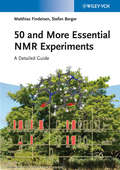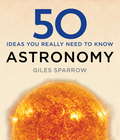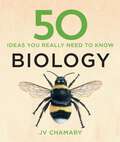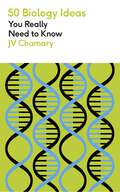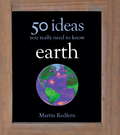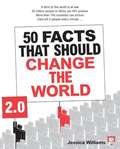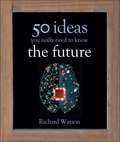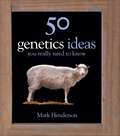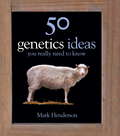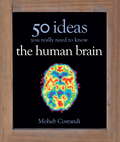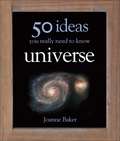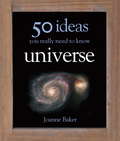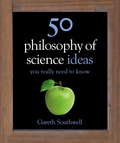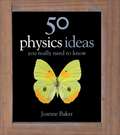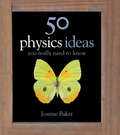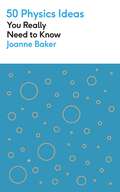- Table View
- List View
50 and More Essential NMR Experiments
by Matthias Findeisen Stefan BergerThis book is the perfect link for learning how to perform the experiments after only having studied theory. In eight chapters more than 50 essential NMR experiments are described in detail. Special focus is put on the organic set of NMR spectra (1H, 13C-APT, COSY, NOESY, HSQC and HMBC). Different chapters deal with advanced organic NMR, selective methods, heteronuclear NMR, relaxation and diffusion measurements, organic applications and maintenance. Every experiment has a section providing the reader with the purpose and scope of the specific experiment. Every experiment is concluded with the spectrum as it is obtained under the conditions described. Questionsand comments enable the reader to check their understanding. The authors are very experienced and the whole book is in full color, which enhances the reading experience and makes the spectra and other figures easier to understand.This book is strongly recommended for all students and researchers who are involved in the structural elucidation of chemical compounds both in practical education and in pursuing research, in particular if they handle an NMR spectrometer.
50 Astronomy Ideas You Really Need to Know
by Giles SparrowFrom our own solar system to the edges of the universe, 50 Astronomy Ideas You Really Need to Know is your introduction to the most important concepts, discoveries and mysteries in astronomy. How did the universe begin? Where did the Moon come from? What happens in the heart of a black hole? Why are gravitational waves so significant? And is there life elsewhere in the cosmos?In fifty fascinating essays covering the central ideas of astronomy and cosmology, accompanied by diagrams, definitions of essential terms and timelines of key discoveries, this book examines the nature and variety of our universe - the life cycle of stars, the formation of planets, the structure of galaxies and the puzzles of dark matter and the multiverse. Expansive and illuminating, 50 Astronomy Ideas You Really Need to Know is the complete guide to the birth, life and possible death of the cosmos.
50 Biology Ideas You Really Need to Know
by Jv Chamary50 Biology Ideas You Really Need to Know is your guide to the most significant and stimulating questions in the study of life. Why do species evolve? Can characteristics be inherited without DNA? Are all organisms made of cells? What makes us human? This book provides succinct answers to all these questions, and many more, in 50 lucid and engaging essays that cover both classic experiments and the latest research.From the mysteries of sex and sleep, from mass extinction to immunity, 50 Biology Ideas You Really Need to Know will open your eyes to the fundamental processes that are vital to life on Earth, including how genes control the growth and behaviour of living things, how a body develops from a single cell, and how environmental forces create natural diversity through evolution. Featuring key concepts explained in simple terms, and with clear diagrams and timelines showing major scientific discoveries within their historical context, this book will give you a complete overview of a fascinating subject.Contents include: Evolution, Genes, Homeostasis, Endosymbiosis, Sex, Multicellularity, Nerves, Genetic Drift, Speciation, Convergent Evolution, Pollination, Mimicry, Laws of Inheritance, DNA, Alternative Splicing, Viruses, Epigenetics, Photosynthesis, Cancer, Differentiation, Regeneration, Morphogenesis, Memory, Sleep, Ageing, Consciousness and the Gaia Hypothesis.
50 Biology Ideas You Really Need to Know (50 Ideas You Really Need to Know series)
by JV Chamary50 Biology Ideas You Really Need to Know is your guide to the most significant and stimulating questions in the study of life. Why do species evolve? Can characteristics be inherited without DNA? Are all organisms made of cells? What makes us human? This book provides succinct answers to all these questions, and many more, in 50 lucid and engaging essays that cover both classic experiments and the latest research.From the mysteries of sex and sleep, from mass extinction to immunity, 50 Biology Ideas You Really Need to Know will open your eyes to the fundamental processes that are vital to life on Earth, including how genes control the growth and behaviour of living things, how a body develops from a single cell, and how environmental forces create natural diversity through evolution. Featuring key concepts explained in simple terms, and with clear diagrams and timelines showing major scientific discoveries within their historical context, this book will give you a complete overview of a fascinating subject.Contents include: Evolution, Genes, Homeostasis, Endosymbiosis, Sex, Multicellularity, Nerves, Genetic Drift, Speciation, Convergent Evolution, Pollination, Mimicry, Laws of Inheritance, DNA, Alternative Splicing, Viruses, Epigenetics, Photosynthesis, Cancer, Differentiation, Regeneration, Morphogenesis, Memory, Sleep, Ageing, Consciousness and the Gaia Hypothesis.
50 Biology Ideas You Really Need to Know (50 Ideas You Really Need to Know series)
by JV Chamary50 Biology Ideas You Really Need to Know is your guide to the most significant and stimulating questions in the study of life. Why do species evolve? Can characteristics be inherited without DNA? Are all organisms made of cells? What makes us human? This book provides succinct answers to all these questions, and many more, in 50 lucid and engaging essays that cover both classic experiments and the latest research.From the mysteries of sex and sleep, from mass extinction to immunity, 50 Biology Ideas You Really Need to Know will open your eyes to the fundamental processes that are vital to life on Earth, including how genes control the growth and behaviour of living things, how a body develops from a single cell, and how environmental forces create natural diversity through evolution. Featuring key concepts explained in simple terms, and with clear diagrams and timelines showing major scientific discoveries within their historical context, this book will give you a complete overview of a fascinating subject.Contents include: Evolution, Genes, Homeostasis, Endosymbiosis, Sex, Multicellularity, Nerves, Genetic Drift, Speciation, Convergent Evolution, Pollination, Mimicry, Laws of Inheritance, DNA, Alternative Splicing, Viruses, Epigenetics, Photosynthesis, Cancer, Differentiation, Regeneration, Morphogenesis, Memory, Sleep, Ageing, Consciousness and the Gaia Hypothesis.
50 Biology Ideas You Really Need to Know (50 Ideas You Really Need to Know series)
by JV ChamaryMaster the biology ideas that shape our living world.In a series of 50 accessible essays, JV Chamary introduces and explains the fundamental processes, ideas and theories that are vital to life on Earth.From the mysteries of sex and sleep to mass extinction and immunity, 50 Biology Ideas You Really Need to Know is a complete introduction to the most important biology concepts in history.Contents include: Evolution, Genes, Homeostasis, Endosymbiosis, Sex, Multicellularity, Nerves, Genetic Drift, Speciation, Convergent Evolution, Pollination, Mimicry, Laws of Inheritance, DNA, Alternative Splicing, Viruses, Epigenetics, Photosynthesis, Cancer, Differentiation, Regeneration, Morphogenesis, Memory, Sleep, Ageing, Consciousness and the Gaia Hypothesis.
50 Biology Ideas You Really Need to Know (50 Ideas You Really Need to Know series)
by JV ChamaryMaster the biology ideas that shape our living world.In a series of 50 accessible essays, JV Chamary introduces and explains the fundamental processes, ideas and theories that are vital to life on Earth.From the mysteries of sex and sleep to mass extinction and immunity, 50 Biology Ideas You Really Need to Know is a complete introduction to the most important biology concepts in history.Contents include: Evolution, Genes, Homeostasis, Endosymbiosis, Sex, Multicellularity, Nerves, Genetic Drift, Speciation, Convergent Evolution, Pollination, Mimicry, Laws of Inheritance, DNA, Alternative Splicing, Viruses, Epigenetics, Photosynthesis, Cancer, Differentiation, Regeneration, Morphogenesis, Memory, Sleep, Ageing, Consciousness and the Gaia Hypothesis.
50 Earth Ideas (50 Ideas You Really Need to Know series)
by Martin RedfernThis latest book in the bestselling '50 Ideas' series is a wonderfully accessible overview of the only place we know of in the universe that is capable of sustaining life. Expert popular science writer Martin Redfern covers all the natural processes of the Earth: climate, ocean currents, air currents, the elements, plate tectonics, fossils, the evolution of life, volcanology, sea levels and the ultimate fate of the Earth. The 50 Ideas featured include: Geological formation; Rock layers; Formation of the atmosphere; Plate tectonics; Continental rifts; Volcanology; Simple life; Multi-cellular life; Snowball Earth; Gondwana and Pangea; Sexual selection; Complex life; The Cambrian revolution; The dinosaurs; Avalonia; The sauropod puzzle; End of the Mesozoic; The Cenozoic recovery; The Great Warming; The 'Great Flood'; The Holocene; Biodiversity and The fate of the Earth.
50 Earth Ideas
by Martin RedfernThis latest book in the bestselling '50 Ideas' series is a wonderfully accessible overview of the only place we know of in the universe that is capable of sustaining life. Expert popular science writer Martin Redfern covers all the natural processes of the Earth: climate, ocean currents, air currents, the elements, plate tectonics, fossils, the evolution of life, volcanology, sea levels and the ultimate fate of the Earth. The 50 Ideas featured include: Geological formation; Rock layers; Formation of the atmosphere; Plate tectonics; Continental rifts; Volcanology; Simple life; Multi-cellular life; Snowball Earth; Gondwana and Pangea; Sexual selection; Complex life; The Cambrian revolution; The dinosaurs; Avalonia; The sauropod puzzle; End of the Mesozoic; The Cenozoic recovery; The Great Warming; The 'Great Flood'; The Holocene; Biodiversity and The fate of the Earth.
50 Facts That Should Change the World (revised and updated)
by Jessica WilliamsJessica Williams revisits her classic series of snapshots of life in the twenty-first century. Revised and updated with lots of new material, this book is every bit as vital as the first edition. From the inequalities and absurdities of the so-called developed world to the vast scale of suffering wreaked by war, famine, and AIDS in developing countries, it paints a picture of incredible contrasts. This 2.0 edition again contains an eclectic selection of facts addressing a broad range of global issues, now with added emphasis on climate change, the decline in human rights and democratic freedoms around the world, the unexpected global impact of corporate growth, sports and media madness and inequality, and lots of updated facts and figures. Each is followed by a short essay explaining the story behind the fact, fleshing out the bigger problem lurking behind the numbers. Real-life stories, anecdotes, and case studies help to humanize the figures and make clear the human impact of the bald statistics. All of the facts remind us that whether we like to think of it or not, the world is interconnected and civilization is a fragile concept. Williams makes us think about some of the hard facts about our civilization and what we can do about them.
50 Future Ideas You Really Need to Know
by Richard WatsonWhat will the world look like in 2020, 2030 or even 2100? How will progress in scientific research affect human life in the areas of health and lifestyle, energy and the environment, politics and conflict, space exploration and even the ultimate questions of existence? This thoroughly researched and superbly written book offers an electrifying trip through the wonders--and terrors--awaiting us over the next hundred years.
50 Genetics Ideas You Really Need to Know
by Mark HendersonIn recent years knowledge of our genetic code has changed our understanding of life on Earth. New genetic technologies are transforming the way we live and promise treatments for otherwise incurable diseases. But these advances are also generating controversy, particularly surrounding issues such as cloning and designer babies. In 50 Genetics Ideas, Mark Henderson distills the central ideas of genetics in a series of clear and concise essays. Beginning with the theory of evolution, and covering such topics as the genome and how nature and nurture work together, he not only illuminates the role of genes in shaping our behaviour and sexuality, but also the very latest, cutting-edge developments in gene therapy and artificial life. Accessible and informative, 50 Genetics Ideas is a timely introduction to this young and ground-breaking strand of science.
50 Genetics Ideas You Really Need to Know
by Mark HendersonIn recent years knowledge of our genetic code has changed our understanding of life on Earth. New genetic technologies are transforming the way we live and promise treatments for otherwise incurable diseases. But these advances are also generating controversy, particularly surrounding issues such as cloning and designer babies. In 50 Genetics Ideas, Mark Henderson distils the central ideas of genetics in a series of clear and concise essays. Beginning with the theory of evolution, and covering such topics as the genome and how nature and nurture work together, he not only illuminates the role of genes in shaping our behaviour and sexuality, but also the very latest, cutting-edge developments in gene therapy and artificial life. Accessible and informative, 50 Genetics Ideas is a timely introduction to this young and ground-breaking strand of science.
50 Genetics Ideas You Really Need to Know (50 Ideas You Really Need to Know series)
by Mark HendersonIn recent years knowledge of our genetic code has changed our understanding of life on Earth. New genetic technologies are transforming the way we live and promise treatments for otherwise incurable diseases. But these advances are also generating controversy, particularly surrounding issues such as cloning and designer babies. In 50 Genetics Ideas, Mark Henderson distils the central ideas of genetics in a series of clear and concise essays. Beginning with the theory of evolution, and covering such topics as the genome and how nature and nurture work together, he not only illuminates the role of genes in shaping our behaviour and sexuality, but also the very latest, cutting-edge developments in gene therapy and artificial life. Accessible and informative, 50 Genetics Ideas is a timely introduction to this young and ground-breaking strand of science.
50 Human Brain Ideas You Really Need to Know (50 Ideas You Really Need to Know series)
by Moheb CostandiNeuroscience is one of the most fascinating and complex areas of scientific research, with new advances being made every day. In 50 Human Brain Ideas You Really Need to Know, Mo Costandi condenses all we know about the brain and how it works into series of introductions to the most important concepts. Outlining both long-standing theories - such as the function of neurons and synaptic transmission - and cutting-edge ideas - including neuroethics and brain-computer interfacing - with straightforward narrative and clear two-colour illustrations, this book is a perfect beginner's guide to the most powerful and mysterious organ in the body. The ideas explored include: The nervous impulse; Differences between the male and female brain; The root of addiction; Neurobiological basis for personality; The relationship between sleep and memory.
50 Human Brain Ideas You Really Need to Know
by Moheb CostandiNeuroscience is one of the most fascinating and complex areas of scientific research, with new advances being made every day. In 50 Human Brain Ideas You Really Need to Know, Mo Costandi condenses all we know about the brain and how it works into series of introductions to the most important concepts. Outlining both long-standing theories - such as the function of neurons and synaptic transmission - and cutting-edge ideas - including neuroethics and brain-computer interfacing - with straightforward narrative and clear two-colour illustrations, this book is a perfect beginner's guide to the most powerful and mysterious organ in the body. The ideas explored include: The nervous impulse; Differences between the male and female brain; The root of addiction; Neurobiological basis for personality; The relationship between sleep and memory.
50 Ideas You Really Need to Know: Universe
by Joanne BakerFrom dwarf planets to dark energy; and from the Big Bang to the death of stars, this book is the perfect introduction to the cutting-edge science that is shaping our understanding of our place in the Universe and that could lead to the next great discovery--the detection of life beyond Earth.
50 Ideas You Really Need to Know: Universe
by Joanne BakerFor millennia humanity has gazed in wonder at the night sky, tracked the motions of the planets and attempted to explain our place in the Universe. But only in our own time has the true scale, the astonishing variety and the remarkable strangeness of the cosmos come clearly into focus. The pace and sophistication of recent scientific discovery has been breathtaking, but breakthroughs are often difficult to understand and their impact is hard to fully appreciate. In 50 Ideas You Really Need to Know: Universe, Joanne Baker clearly and concisely explains all of the essential concepts, major discoveries and the very latest thinking in astrophysics, including: the basic principles of astronomy - from heliocentrism to Newton's theory of optics; the constituent parts of the Universe, its creation and evolution; the key concepts of cosmology including the theory of relativity, supermassive black holes and 'multiverses'; the very latest developments in our understanding of quasars, exoplanets and astrobiology. From dwarf planets to dark energy; and from the Big Bang to the death of stars, this book is the perfect introduction to the cutting-edge science that is shaping our understanding of our place in the Universe and that could lead to the next great discovery - the detection of life beyond Earth.
50 Philosophy of Science Ideas You Really Need to Know (50 Ideas You Really Need to Know series)
by Gareth SouthwellScience first began as a branch of philosophy, but it has since grown up and moved out of the family home, and its successes have put its parent in the shade. Thanks to scientific knowledge we have walked on the Moon, cured once-fatal illnesses, and even identified the very building blocks of life and the universe. But it is these very successes that underline the need for philosophy. How much should we trust the pronouncements of scientists that we read in the media? What are the ethical implications of our delving into the foundations of our DNA, reproductive treatments, or artificially prolonging life? And are there limits to what science can tell us about the world we think we know? In straightforward and accessible terms, 50 Philosophy of Science Ideas You Really Need to Know explains the key philosophical questions that continue to lie at the heart of the nature and practice of science today. The ideas explored include: Appearance and reality; Knowledge; Anti-realism; Metaphysics; Science and gender; Phenomenology and science.
50 Philosophy of Science Ideas You Really Need to Know (50 Ideas You Really Need To Know Ser.)
by Gareth SouthwellScience first began as a branch of philosophy, but it has since grown up and moved out of the family home, and its successes have put its parent in the shade. Thanks to scientific knowledge we have walked on the Moon, cured once-fatal illnesses, and even identified the very building blocks of life and the universe. But it is these very successes that underline the need for philosophy. How much should we trust the pronouncements of scientists that we read in the media? What are the ethical implications of our delving into the foundations of our DNA, reproductive treatments, or artificially prolonging life? And are there limits to what science can tell us about the world we think we know? In straightforward and accessible terms, 50 Philosophy of Science Ideas You Really Need to Know explains the key philosophical questions that continue to lie at the heart of the nature and practice of science today. The ideas explored include: Appearance and reality; Knowledge; Anti-realism; Metaphysics; Science and gender; Phenomenology and science.
50 Physics Ideas You Really Need to Know
by Joanne BakerIn this, the second volume in an important new series presenting core concepts across a range of critical areas of human knowledge, author Joanne Baker unravels the complexities of 20th-century scientific theory for a general readership. From Hubble's law to the Pauli exclusion principle, and from Schrödinger's cat to Heisenberg's uncertainty principle, she explains ideas at the cutting-edge of scientific enquiry, making them comprehensible and accessible to the layperson.
50 Physics Ideas You Really Need to Know
by Joanne BakerWe encounter physics before we've even left the house in the morning; an alarm clock tracks time, a mirror reflects light waves and our mobile phones rely on satellites held in their orbit by gravity. Where would we be without the Bernoulli equation to explain how planes fly, electromagnetic waves enabling us to communicate around the world or the discovery of X-rays? In 50 Physics Ideas You Really Need to Know Joanne Baker will uncover the physics all around us, from basic concepts like gravity, light and energy through to the complexities of quantum theory, chaos and dark energy. Featuring short biographies of iconic physicists, explanatory diagrams and timelines showing discoveries within their historical context, this book is the perfect guide to the fundamental concepts of physics, making even the most challenging theories easy to understand. Contents include: Newton's law of gravitation, Brownian motion, Chaos theory, Fleming's right hand rule, Planck's law, Heisenberg's uncertainty principle, Schrodinger's cat, Superconductivity, Rutherford's atom, Nuclear fission and fusion, The God particle, String theory, Special and general relativity, The big bang and the Anthropic principle.
50 Physics Ideas You Really Need to Know (50 Ideas You Really Need to Know series)
by Joanne BakerWe encounter physics before we've even left the house in the morning; an alarm clock tracks time, a mirror reflects light waves and our mobile phones rely on satellites held in their orbit by gravity. Where would we be without the Bernoulli equation to explain how planes fly, electromagnetic waves enabling us to communicate around the world or the discovery of X-rays? In 50 Physics Ideas You Really Need to Know Joanne Baker will uncover the physics all around us, from basic concepts like gravity, light and energy through to the complexities of quantum theory, chaos and dark energy. Featuring short biographies of iconic physicists, explanatory diagrams and timelines showing discoveries within their historical context, this book is the perfect guide to the fundamental concepts of physics, making even the most challenging theories easy to understand. Contents include: Newton's law of gravitation, Brownian motion, Chaos theory, Fleming's right hand rule, Planck's law, Heisenberg's uncertainty principle, Schrodinger's cat, Superconductivity, Rutherford's atom, Nuclear fission and fusion, The God particle, String theory, Special and general relativity, The big bang and the Anthropic principle.
50 Physics Ideas You Really Need to Know (50 Ideas You Really Need to Know series)
by Joanne BakerIn a series of 50 accessible essays, Joanne Baker introduces and explains the fundamental physical concepts and laws that govern the inners workings of our universe.From Newton's law of gravitation to black holes, Schrödinger's cat to chaos theory, 50 Physics Ideas You Really Need to Know is a complete introduction to the most important physics concepts in history.
50 Physics Ideas You Really Need to Know (50 Ideas You Really Need to Know series)
by Joanne BakerIn a series of 50 accessible essays, Joanne Baker introduces and explains the fundamental physical concepts and laws that govern the inners workings of our universe.From Newton's law of gravitation to black holes, Schrödinger's cat to chaos theory, 50 Physics Ideas You Really Need to Know is a complete introduction to the most important physics concepts in history.
